- Home
- Arthur Conan Doyle
The Adventure of the Abbey Grange. Page 2
The Adventure of the Abbey Grange. Read online
Page 2
“Yes, it was by their light, and that of the lady’s bedroom candle, that the burglars saw their way about.”
“And what did they take?”
Well, they did not take much --mdash; only half a dozen articles of plate off the sideboard. Lady Brackenstall thinks that they were themselves so disturbed by the death of Sir Eustace that they did not ransack the house, as they would otherwise have done.”
“No doubt that is true, and yet they drank some wine, I understand.”
“To steady their nerves.”
Exactly. These three glasses upon the sideboard have been untouched, I suppose?”
“Yes, and the bottle stands as they left it.”
“Let us look at it. Halloa, halloa! What is this?”
The three glasses were grouped together, all of them tinged with wine, and one of them containing some dregs of beeswing. The bottle stood near them, two-thirds full, and beside it lay a long, deeply stained cork. Its appearance and the dust upon the bottle showed that it was no common vintage which the murderers had enjoyed.
A change had come over Holmes’s manner. He had lost his listless expression, and again I saw an alert light of interest in his keen, deep-set eyes. He raised the cork and examined it minutely.
“How did they draw it?” he asked.
Hopkins pointed to a half-opened drawer. In it lay some table linen and a large corkscrew.
“Did Lady Brackenstall say that screw was used?”
“No, you remember that she was senseless at the moment when the bottle was opened.”
“Quite so. As a matter of fact, that screw was not used. This bottle was opened by a pocket screw, probably contained in a knife, and not more than an inch and a half long. If you will examine the top of the cork, you will observe that the screw was driven in three times before the cork was extracted. It has never been transfixed. This long screw would have transfixed it and drawn it up with a single pull. When you catch this fellow, you will find that he has one of these multiplex knives in his possession.”
“Excellent!” said Hopkins.
But these glasses do puzzle me, I confess. Lady Brackenstall actually saw the three men drinking, did she not?”
“Yes; she was clear about that.”
“Then there is an end of it. What more is to be said? And yet, you must admit, that the three glasses are very remarkable, Hopkins. What? You see nothing remarkable? Well, well, let it pass. Perhaps, when a man has special knowledge and special powers like my own, it rather encourages him to seek a complex explanation when a simpler one is at hand. Of course, it must be a mere chance about the glasses. Well, good-morning, Hopkins. I don’t see that I can be of any use to you, and you appear to have your case very clear. You will let me know when Randall is arrested, and any further developments which may occur. I trust that I shall soon have to congratulate you upon a successful conclusion. Come, Watson, I fancy that we may employ ourselves more profitably at home.”
During our return journey, I could see by Holmes’s face that he was much puzzled by something which he had observed. Every now and then, by an effort, he would throw off the impression, and talk as if the matter were clear, but then his doubts would settle down upon him again, and his knitted brows and abstracted eyes would show that his thoughts had gone back once more to the great dining-room of the Abbey Grange, in which this midnight tragedy had been enacted. At last, by a sudden impulse, just as our train was crawling out of a suburban station, he sprang on to the platform and pulled me out after him.
“Excuse me, my dear fellow,” said he, as we watched the rear carriages of our train disappearing round a curve, “I am sorry to make you the victim of what may seem a mere whim, but on my life, Watson, I simply can’t leave that case in this condition. Every instinct that I possess cries out against it. It’s wrong --mdash; it’s all wrong --mdash; I’ll swear that it’s wrong. And yet the lady’s story was complete, the maid’s corroboration was sufficient, the detail was fairly exact. What have I to put up against that? Three wine-glasses, that is all. But if I had not taken things for granted, if I had examined everything with care which I should have shown had we approached the case de novo and had no cut-and-dried story to warp my mind, should I not then have found something more definite to go upon? Of course I should. Sit down on this bench, Watson, until a train for Chiselhurst arrives, and allow me to lay the evidence before you, imploring you in the first instance to dismiss from your mind the idea that anything which the maid or her mistress may have said must necessarily be true. The lady’s charming personality must not be permitted to warp our judgment.
“Surely there are details in her story which, if we looked at in cold blood, would excite our suspicion. These burglars made a considerable haul at Sydenham a fortnight ago. Some account of them and of their appearance was in the papers, and would naturally occur to anyone who wished to invent a story in which imaginary robbers should play a part. As a matter of fact, burglars who have done a good stroke of business are as a rule only too glad to enjoy the proceeds in peace and quiet without embarking on another perilous undertaking. Again, it is unusual for burglars to operate at so early an hour, it is unusual for burglars to strike a lady to prevent her screaming, since one would imagine that was the sure way to make her scream, it is unusual for them to commit murder when their numbers are sufficient to overpower one man, it is unusual for them to be content with a limited plunder when there was much more within their reach, and finally, I should say, that it was very unusual for such men to leave a bottle half empty. How do all these unusuals strike you, Watson?”
“Their cumulative effect is certainly considerable, and yet each of them is quite possible in itself. The most unusual thing of all, as it seems to me, is that the lady should be tied to the chair.”
“Well, I am not so clear about that, Watson, for it is evident that they must either kill her or else secure her in such a way that she could not give immediate notice of their escape. But at any rate I have shown, have I not, that there is a certain element of improbability about the lady’s story? And now, on the top of this, comes the incident of the wineglasses.”
“What about the wineglasses?”
Can you see them in your mind’s eye?”
“I see them clearly.”
We are told that three men drank from them. Does that strike you as likely?”
“Why not? There was wine in each glass.”
“Exactly, but there was beeswing only in one glass. You must have noticed that fact. What does that suggest to your mind?”
“The last glass filled would be most likely to contain beeswing.”
“Not at all. The bottle was full of it, and it is inconceivable that the first two glasses were clear and the third heavily charged with it. There are two possible explanations, and only two. One is that after the second glass was filled the bottle was violently agitated, and so the third glass received the beeswing. That does not appear probable. No, no, I am sure that I am right.”
“What, then, do you suppose?”
That only two glasses were used, and that the dregs of both were poured into a third glass, so as to give the false impression that three people had been here. In that way all the beeswing would be in the last glass, would it not? Yes, I am convinced that this is so. But if I have hit upon the true explanation of this one small phenomenon, then in an instant the case rises from the commonplace to the exceedingly remarkable, for it can only mean that Lady Brackenstall and her maid have deliberately lied to us, that not one word of their story is to be believed, that they have some very strong reason for covering the real criminal, and that we must construct our case for ourselves without any help from them. That is the mission which now lies before us, and here, Watson, is the Sydenham train.”
The household at the Abbey Grange were much surprised at our return, but Sherlock Holmes, finding that Stanley Hopkins had gone off to report to headquarters, took possession of the dining-room, locked the door upon the inside, a
nd devoted himself for two hours to one of those minute and laborious investigations which form the solid basis on which his brilliant edifices of deduction were reared. Seated in a corner like an interested student who observes the demonstration of his professor, I followed every step of that remarkable research. The window, the curtains, the carpet, the chair, the rope --mdash; each in turn was minutely examined and duly pondered. The body of the unfortunate baronet had been removed, and all else remained as we had seen it in the morning. Finally, to my astonishment, Holmes climbed up on to the massive mantelpiece. Far above his head hung the few inches of red cord which were still attached to the wire. For a long time he gazed upward at it, and then in an attempt to get nearer to it he rested his knee upon a wooden bracket on the wall. This brought his hand within a few inches of the broken end of the rope, but it was not this so much as the bracket itself which seemed to engage his attention. Finally, he sprang down with an ejaculation of satisfaction.
“It’s all right, Watson,” said he. We have got our case --mdash; one of the most remarkable in our collection. But, dear me, how slow-witted I have been, and how nearly I have committed the blunder of my lifetime! Now, I think that, with a few missing links, my chain is almost complete.”
“You have got your men?”
Man, Watson, man. Only one, but a very formidable person. Strong as a lion --mdash; witness the blow that bent that poker! Six foot three in height, active as a squirrel, dexterous with his fingers, finally, remarkably quick-witted, for this whole ingenious story is of his concoction. Yes, Watson, we have come upon the handiwork of a very remarkable individual. And yet, in that bell-rope, he has given us a clue which should not have left us a doubt.”
“Where was the clue?”
Well, if you were to pull down a bell-rope, Watson, where would you expect it to break? Surely at the spot where it is attached to the wire. Why should it break three inches from the top, as this one has done?”
“Because it is frayed there?”
“Exactly. This end, which we can examine, is frayed. He was cunning enough to do that with his knife. But the other end is not frayed. You could not observe that from here, but if you were on the mantelpiece you would see that it is cut clean off without any mark of fraying whatever. You can reconstruct what occurred. The man needed the rope. He would not tear it down for fear of giving the alarm by ringing the bell. What did he do? He sprang up on the mantelpiece, could not quite reach it, put his knee on the bracket --mdash; you will see the impression in the dust --mdash; and so got his knife to bear upon the cord. I could not reach the place by at least three inches --mdash; from which I infer that he is at least three inches a bigger man than I. Look at that mark upon the seat of the oaken chair! What is it?”
“Blood.”
Undoubtedly it is blood. This alone puts the lady’s story out of court. If she were seated on the chair when the crime was done, how comes that mark? No, no, she was placed in the chair after the death of her husband. I’ll wager that the black dress shows a corresponding mark to this. We have not yet met our Waterloo, Watson, but this is our Marengo, for it begins in defeat and ends in victory. I should like now to have a few words with the nurse, Theresa. We must be wary for a while, if we are to get the information which we want.”
She was an interesting person, this stern Australian nurse --mdash; taciturn, suspicious, ungracious, it took some time before Holmes’s pleasant manner and frank acceptance of all that she said thawed her into a corresponding amiability. She did not attempt to conceal her hatred for her late employer.
“Yes, sir, it is true that he threw the decanter at me. I heard him call my mistress a name, and I told him that he would not dare to speak so if her brother had been there. Then it was that he threw it at me. He might have thrown a dozen if he had but left my bonny bird alone. He was forever ill-treating her, and she too proud to complain. She will not even tell me all that he has done to her. She never told me of those marks on her arm that you saw this morning, but I know very well that they come from a stab with a hatpin. The sly devil --mdash; God forgive me that I should speak of him so, now that he is dead! But a devil he was, if ever one walked the earth. He was all honey when first we met him --mdash; only eighteen months ago, and we both feel as if it were eighteen years. She had only just arrived in London. Yes, it was her first voyage --mdash; she had never been from home before. He won her with his title and his money and his false London ways. If she made a mistake she has paid for it, if ever a woman did. What month did we meet him? Well, I tell you it was just after we arrived. We arrived in June, and it was July. They were married in January of last year. Yes, she is down in the morning-room again, and I have no doubt she will see you, but you must not ask too much of her, for she has gone through all that flesh and blood will stand.”
Lady Brackenstall was reclining on the same couch, but looked brighter than before. The maid had entered with us, and began once more to foment the bruise upon her mistress’s brow.
“I hope,” said the lady, that you have not come to cross-examine me again?”
“No,” Holmes answered, in his gentlest voice, I will not cause you any unnecessary trouble, Lady Brackenstall, and my whole desire is to make things easy for you, for I am convinced that you are a much-tried woman. If you will treat me as a friend and trust me, you may find that I will justify your trust.”
“What do you want me to do?”
To tell me the truth.”
“Mr. Holmes!”
No, no, Lady Brackenstall --mdash; it is no use. You may have heard of any little reputation which I possess. I will stake it all on the fact that your story is an absolute fabrication.”
Mistress and maid were both staring at Holmes with pale faces and frightened eyes.
“You are an impudent fellow!” cried Theresa. “Do you mean to say that my mistress has told a lie?”
Holmes rose from his chair.
“Have you nothing to tell me?”
“I have told you everything.”
Think once more, Lady Brackenstall. Would it not be better to be frank?”
For an instant there was hesitation in her beautiful face. Then some new strong thought caused it to set like a mask.
“I have told you all I know.”
Holmes took his hat and shrugged his shoulders. “I am sorry,” he said, and without another word we left the room and the house. There was a pond in the park, and to this my friend led the way. It was frozen over, but a single hole was left for the convenience of a solitary swan. Holmes gazed at it, and then passed on to the lodge gate. There he scribbled a short note for Stanley Hopkins, and left it with the lodge-keeper.
“It may be a hit, or it may be a miss, but we are bound to do something for friend Hopkins, just to justify this second visit,” said he. “I will not quite take him into my confidence yet. I think our next scene of operations must be the shipping office of the Adelaide-Southampton line, which stands at the end of Pall Mall, if I remember right. There is a second line of steamers which connect South Australia with England, but we will draw the larger cover first.”
Holmes’s card sent in to the manager ensured instant attention, and he was not long in acquiring all the information he needed. In June of ’95, only one of their line had reached a home port. It was the Rock of Gibraltar, their largest and best boat. A reference to the passenger list showed that Miss Fraser, of Adelaide, with her maid had made the voyage in her. The boat was now somewhere south of the Suez Canal on her way to Australia. Her officers were the same as in ’95, with one exception. The first officer, Mr. Jack Crocker, had been made a captain and was to take charge of their new ship, the Bass Rock, sailing in two days’ time from Southampton. He lived at Sydenham, but he was likely to be in that morning for instructions, if we cared to wait for him.
No, Mr. Holmes had no desire to see him, but would be glad to know more about his record and character.
His record was magnificent. There was not an officer in the fleet
to touch him. As to his character, he was reliable on duty but a wild, desperate fellow off the deck of his ship --mdash; hotheaded, excitable, but loyal, honest, and kind-hearted. That was the pith of the information with which Holmes left the office of the Adelaide-Southampton company. Thence he drove to Scotland Yard, but, instead of entering, he sat in his cab with his brows drawn down, lost in profound thought. Finally he drove round to the Charing Cross telegraph office, sent off a message, and then, at last, we made for Baker Street once more.
“No, I couldn’t do it, Watson,” said he, as we reentered our room. “Once that warrant was made out, nothing on earth would save him. Once or twice in my career I feel that I have done more real harm by my discovery of the criminal than ever he had done by his crime. I have learned caution now, and I had rather play tricks with the law of England than with my own conscience. Let us know a little more before we act.”
Before evening, we had a visit from Inspector Stanley Hopkins. Things were not going very well with him.
“I believe that you are a wizard, Mr. Holmes. I really do sometimes think that you have powers that are not human. Now, how on earth could you know that the stolen silver was at the bottom of that pond?”
“I didn’t know it.”
But you told me to examine it.”
“You got it, then?”
Yes, I got it.”
“I am very glad if I have helped you.”
“But you haven’t helped me. You have made the affair far more difficult. What sort of burglars are they who steal silver and then throw it into the nearest pond?”
“It was certainly rather eccentric behaviour. I was merely going on the idea that if the silver had been taken by persons who did not want it --mdash; who merely took it for a blind, as it were --mdash; then they would naturally be anxious to get rid of it.”
“But why should such an idea cross your mind?”
“Well, I thought it was possible. When they came out through the French window, there was the pond with one tempting little hole in the ice, right in front of their noses. Could there be a better hiding-place?”

 The Lost World
The Lost World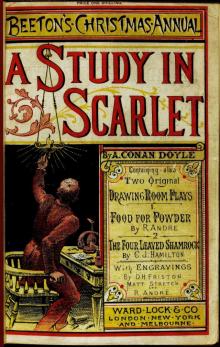 A Study in Scarlet
A Study in Scarlet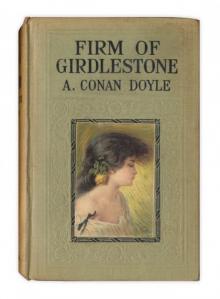 The Firm of Girdlestone
The Firm of Girdlestone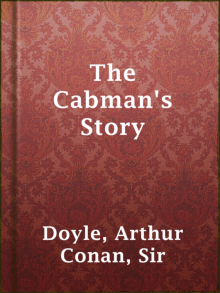 The Cabman's Story
The Cabman's Story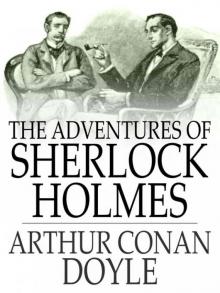 The Adventures of Sherlock Holmes
The Adventures of Sherlock Holmes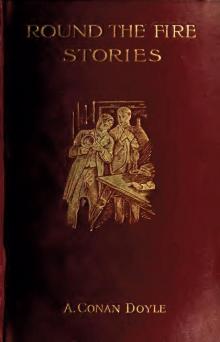 Round the Fire Stories
Round the Fire Stories His Last Bow: An Epilogue of Sherlock Holmes
His Last Bow: An Epilogue of Sherlock Holmes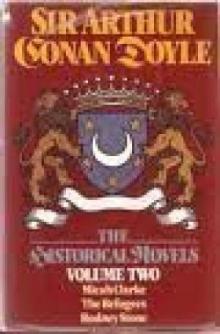 Micah Clarke
Micah Clarke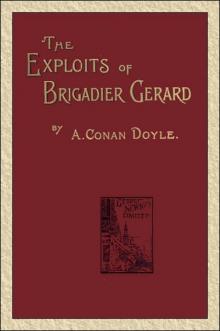 The Exploits of Brigadier Gerard
The Exploits of Brigadier Gerard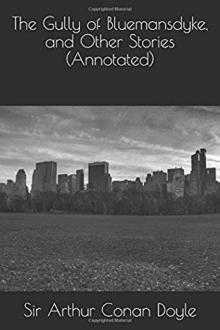 The Gully of Bluemansdyke, and Other stories
The Gully of Bluemansdyke, and Other stories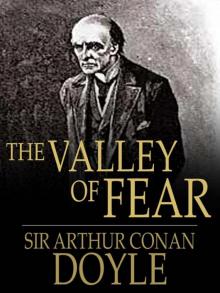 The Valley of Fear
The Valley of Fear The Last of the Legions and Other Tales of Long Ago
The Last of the Legions and Other Tales of Long Ago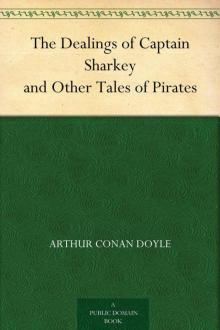 The Dealings of Captain Sharkey, and Other Tales of Pirates
The Dealings of Captain Sharkey, and Other Tales of Pirates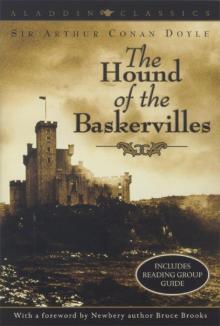 The Hound of the Baskervilles
The Hound of the Baskervilles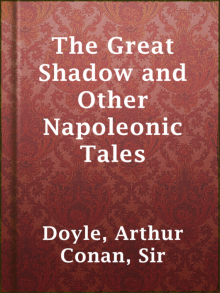 The Great Shadow and Other Napoleonic Tales
The Great Shadow and Other Napoleonic Tales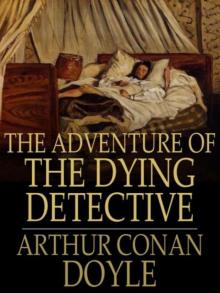 The Adventure of the Dying Detective
The Adventure of the Dying Detective The Man from Archangel, and Other Tales of Adventure
The Man from Archangel, and Other Tales of Adventure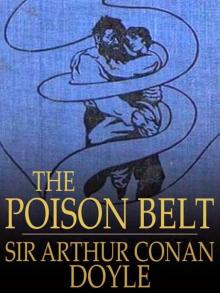 The Poison Belt
The Poison Belt The Last Galley; Impressions and Tales
The Last Galley; Impressions and Tales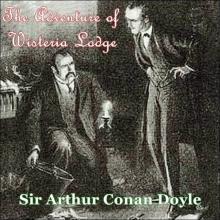 The Adventure of Wisteria Lodge
The Adventure of Wisteria Lodge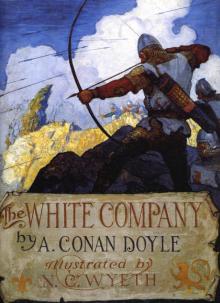 The White Company
The White Company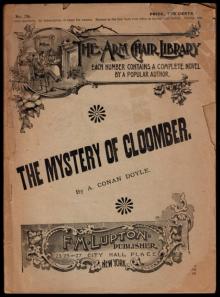 The Mystery of Cloomber
The Mystery of Cloomber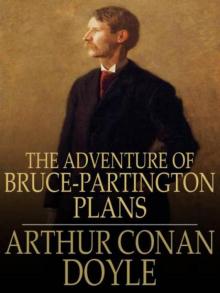 The Adventure of the Bruce-Partington Plans
The Adventure of the Bruce-Partington Plans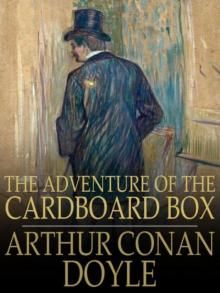 The Adventure of the Cardboard Box
The Adventure of the Cardboard Box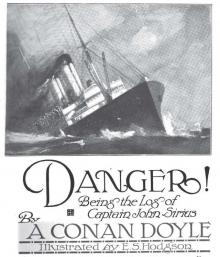 Danger! and Other Stories
Danger! and Other Stories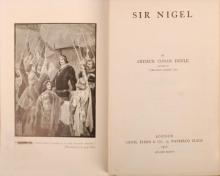 Sir Nigel
Sir Nigel The Return of Sherlock Holmes
The Return of Sherlock Holmes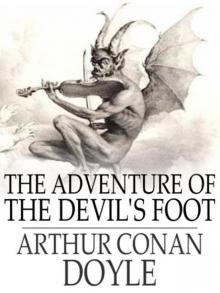 The Adventure of the Devil's Foot
The Adventure of the Devil's Foot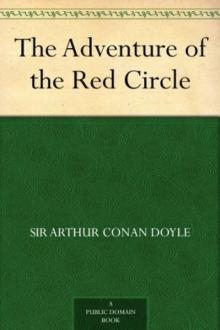 The Adventure of the Red Circle
The Adventure of the Red Circle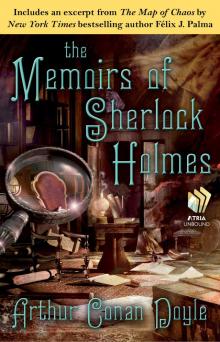 The Memoirs of Sherlock Holmes
The Memoirs of Sherlock Holmes The Adventure of the Yellow Face
The Adventure of the Yellow Face The Adventure of the Norwood Builder
The Adventure of the Norwood Builder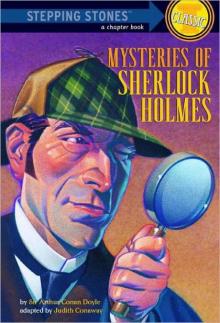 Mysteries of Sherlock Holmes
Mysteries of Sherlock Holmes The Adventure of the Missing Three-Quarter
The Adventure of the Missing Three-Quarter The Adventure of the Final Problem
The Adventure of the Final Problem A Scandal in Bohemia
A Scandal in Bohemia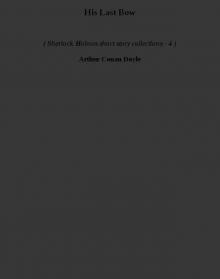 His Last Bow shssc-4
His Last Bow shssc-4 Beyond The City
Beyond The City The Adventure of the Gloria Scott
The Adventure of the Gloria Scott The Parasite
The Parasite The Land Of Mist pcs-3
The Land Of Mist pcs-3 The Adventure of the Musgrave Ritual
The Adventure of the Musgrave Ritual The Complete Sherlock Holmes, Volume I (Barnes & Noble Classics Series)
The Complete Sherlock Holmes, Volume I (Barnes & Noble Classics Series) The Adventure of the Stockbroker's Clerk
The Adventure of the Stockbroker's Clerk The Adventure of the Copper Beeches
The Adventure of the Copper Beeches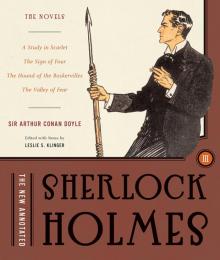 The New Annotated Sherlock Holmes
The New Annotated Sherlock Holmes When The World Screamed pcs-5
When The World Screamed pcs-5 The Adventure of the Six Napoleons
The Adventure of the Six Napoleons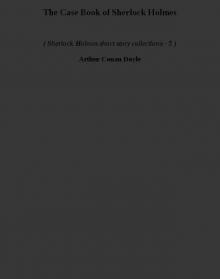 The Case Book of Sherlock Holmes shssc-5
The Case Book of Sherlock Holmes shssc-5 The Sign of Four
The Sign of Four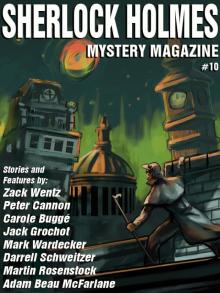 Sherlock Holmes Mystery Magazine #10
Sherlock Holmes Mystery Magazine #10 The Adventures of Brigadier Gerard
The Adventures of Brigadier Gerard The Adventure of the Second Stain
The Adventure of the Second Stain The Adventure of the Engineer's Thumb
The Adventure of the Engineer's Thumb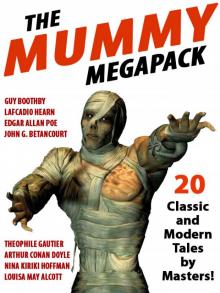 The Mummy Megapack
The Mummy Megapack The Disintegration Machine pcs-4
The Disintegration Machine pcs-4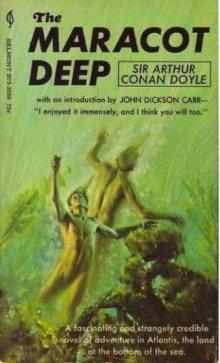 The Maracot Deep
The Maracot Deep The Five Orange Pips
The Five Orange Pips The Adventure of the Crooked Man
The Adventure of the Crooked Man The Adventure of the Blue Carbuncle
The Adventure of the Blue Carbuncle The Adventure of Silver Blaze
The Adventure of Silver Blaze The Adventure of the Solitary Cyclist
The Adventure of the Solitary Cyclist The Adventure of the Naval Treaty
The Adventure of the Naval Treaty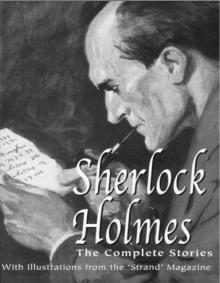 Sherlock Holmes. The Complete Stories
Sherlock Holmes. The Complete Stories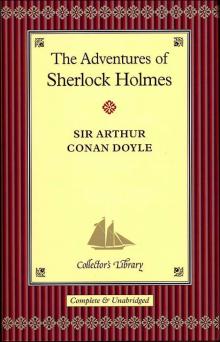 The Adventures of Sherlock Holmes (sherlock holmes)
The Adventures of Sherlock Holmes (sherlock holmes) The Adventure of the Empty House
The Adventure of the Empty House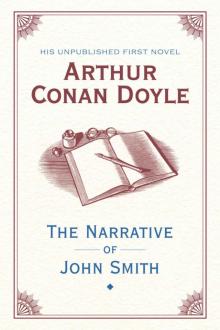 The Narrative of John Smith
The Narrative of John Smith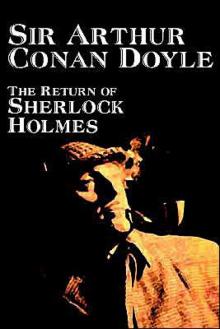 The Return of Sherlock Holmes (sherlock holmes)
The Return of Sherlock Holmes (sherlock holmes) The New Revelation
The New Revelation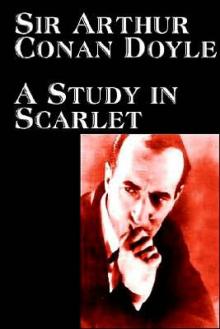 A Study in Scarlet (sherlock holmes)
A Study in Scarlet (sherlock holmes) The Vital Message
The Vital Message Sherlock Holmes Complete Collection
Sherlock Holmes Complete Collection Round the Red Lamp
Round the Red Lamp The Boscombe Valley Mystery
The Boscombe Valley Mystery The Adventure of the Beryl Coronet
The Adventure of the Beryl Coronet The Refugees
The Refugees The Adventure of the Three Students.
The Adventure of the Three Students.